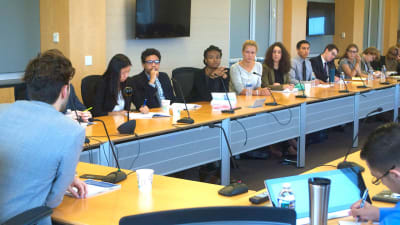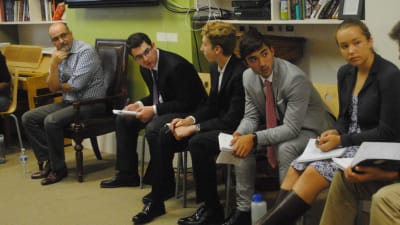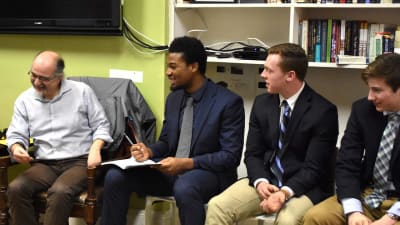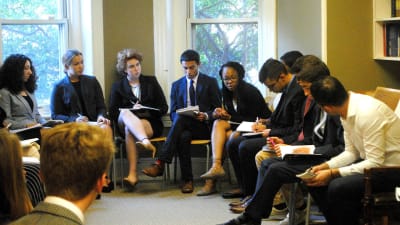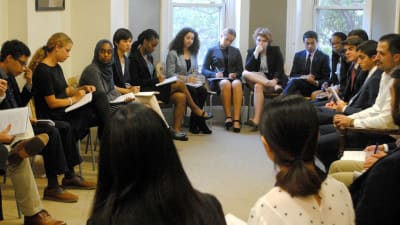Palestinians, Israelis, and Syrians
Is there a more frustrating dispute than the Israeli-Palestinian conflict? It is so filled with fierce misunderstanding that every word, every historical event, every intention can cause unhappiness. And yet the problem remains–and will remain–until we have leaders (perhaps including a few SEGL graduates) who fix it.
This past week, our students heard and discussed two key viewpoints from leaders whose work continues to impact the conflict. (They will hear a third later this semester.) And they also learned about the neighboring Syrian conflict, which threatens even more devastation.
We began with SEGL’s account of Israeli-Palestinian history: the competing promises of T.E. Lawrence and the Balfour Declaration, the competing boundaries in 1948, 1967, and today, the competing visions for the future within Israel and within the Palestinian leadership. This historical account makes every attempt to be unbiased, but we also told the students that many observers on both sides would want to add, subtract, or edit each PowerPoint slide we shared. Skeptical eyes and ears are a must in this area.
(We also underlined another SEGL truism: if, after a case study, you want to hear a view different from the ones presented, say something! If there is enough interest, we can often arrange for a supplementary speaker later in the semester.)
Our first visit was to the American Israel Public Affairs Committee (AIPAC), the leading pro-Israel lobbying organization in the United States, where students met with Adam Teitelbaum, AIPAC’s Leadership Development Director. In this capacity, Teitelbaum works with young people around the country to carry out AIPAC’s goals.
The next Monday, we met with Ghaith al-Omari, a former top advisor to Palestinian leader Mahmoud Abbas and a negotiator in (among other negotiations) the 2000 Camp David peace talks. Al-Omari, who now works with the Washington Institute for Near East Policy, shared stories and strategies from his time as a negotiator. For example, it is not enough to negotiate so that your side “wins.” You must also ensure that the speech your “opponent” gives to her people allows her to claim victory as well–otherwise, the deal will fall through.
(Later this fall, we will travel to the Woodrow Wilson Center–leading DC think-tank–to meet with the noted expert–and advisor to six Secretaries of State–Aaron David Miller. Miller helped provide context for the current status of the conflict and answered questions about his time as a lead negotiator for the U.S.–for example, at the 2000 Camp David II discussions. He is fond of a memorable piece of advice drawn from John F. Kennedy that SEGL students would do well to consider: when asked about his political leanings, Kennedy said “I am an idealist without illusions.”)
The viewpoints were quite varied, and many students reported feeling convinced by each speaker’s strong arguments. In informal and formal discussions that followed, many noted how valuable it was to hear the side they had understood less. Some also were struck by the conciliatory tone all three struck: was there more underneath the surface, or more to be learned from more radical voices?
Meanwhile, after a brief teach-in, we welcomed Deyaa Alrwishdi, who is quickly becoming an SEGL favorite. Until the Syrian war began, Alrwishdi was a well-connected attorney working in the Syrian Defense Ministry. The war forced him to confront a difficult moral dilemma: a dilemma he asked our students to solve before telling his harrowing tale of joining the opposition, escaping Syria, and traveling to the United States, where he currently waits for his asylum application to be approved. (The tale was far more detailed and gripping than this brief overview, but all SEGL speakers join us “off the record” and we respect their wishes. Speak with a student if you would like to learn more!) He documents human rights abuses across Syria, and this year won Stanford University’s Rubin International Human Rights Award. One particularly fascinating moment came when a student asked his views on Donald Trump. (Ask a current student for his response!)
Learning how to ask tough-but-respectful questions and how to discuss the most deeply-felt of issues is an essential part of leadership, and it is an essential part of an SEGL education. We’re proud of how our students handled this case study (and they continue to discuss it over meals and on walks to and from school!).









